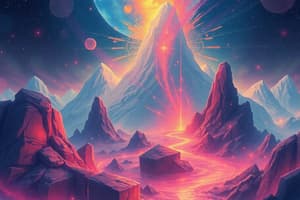Podcast
Questions and Answers
What is the main purpose of machine learning in content creation?
What is the main purpose of machine learning in content creation?
To forecast trends and popularity in content.
How does a recommendation system prioritize content for users?
How does a recommendation system prioritize content for users?
Based on users' viewing histories.
How does AI technology contribute to content creation?
How does AI technology contribute to content creation?
By facilitating rapid innovation and more personalized experiences.
What is the key benefit of AI in content discovery?
What is the key benefit of AI in content discovery?
How does AI push boundaries in content creation?
How does AI push boundaries in content creation?
What is the primary function of computer vision in content creation?
What is the primary function of computer vision in content creation?
How does deep learning contribute to content creation?
How does deep learning contribute to content creation?
Explain the role of Natural Language Processing (NLP) in modern content production.
Explain the role of Natural Language Processing (NLP) in modern content production.
How does reinforcement learning contribute to models in content creation?
How does reinforcement learning contribute to models in content creation?
What are the five key areas of AI technologies shaping modern content creation discussed in the article?
What are the five key areas of AI technologies shaping modern content creation discussed in the article?
Study Notes
AI Technologies Shaping Modern Content Creation
From computer vision to natural language processing (NLP), AI technologies are revolutionizing the way we create, consume, and understand information. In this article, we'll dive into five key areas—computer vision, deep learning, NLP, reinforcement learning, and machine learning—exploring how they contribute to modern content production.
Computer Vision
Computer vision analyzes digital images and videos, enabling computers to recognize objects and scenes within them. Applications of computer vision extend to image tagging, auto-captioning, and photo organization. For instance, image recognition tools can analyze thousands of photos to categorize them automatically.
Deep Learning
Deep learning uses neural networks to identify intricate patterns in large volumes of data. In content creation, deep learning powers tools like text generation systems or sentiment analysis programs, which interpret emotions conveyed via text.
Natural Language Processing (NLP)
NLP enables computers to interact with humans using everyday language. NLP components like named entity recognition, part-of-speech tagging, and semantic analysis facilitate automatic content summarization and classification. NLP systems contribute to SEO optimization and personalized content recommendations.
Reinforcement Learning
In content creation, reinforcement learning trains models through trial and error. This technique enhances AI's ability to optimize strategies, whether content is being ranked, recommended, or created. For instance, a recommendation system may learn to prioritize content based on users' viewing histories, continuously improving its suggestions.
Machine Learning
Machine learning refers to algorithms that improve performance without explicit programming. In content creation, ML systems power recommenders, classifiers, and prediction engines. For example, machine learning can forecast trends and popularity in content, helping creators anticipate demand.
AI technologies are transforming content creation, facilitating rapid innovation and more personalized experiences. From improved content discovery to automated content generation, AI is pushing boundaries, redefining expectations, and shaping the future of communication itself.
Studying That Suits You
Use AI to generate personalized quizzes and flashcards to suit your learning preferences.
Description
Explore how AI technologies such as computer vision, deep learning, NLP, reinforcement learning, and machine learning are reshaping modern content creation. Learn about their applications, from image analysis and automated text generation to personalized content recommendations and trend forecasting.



